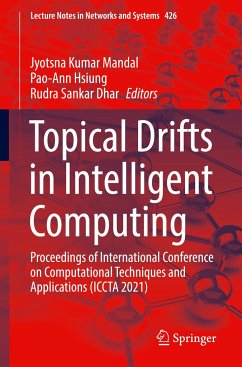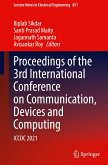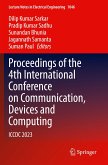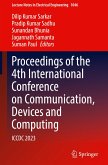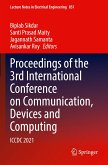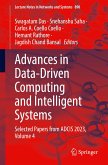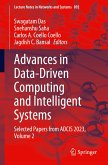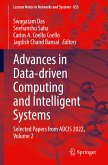Topical Drifts in Intelligent Computing
Proceedings of International Conference on Computational Techniques and Applications (ICCTA 2021)
Herausgegeben:Mandal, Jyotsna Kumar; Hsiung, Pao-Ann; Sankar Dhar, Rudra
Topical Drifts in Intelligent Computing
Proceedings of International Conference on Computational Techniques and Applications (ICCTA 2021)
Herausgegeben:Mandal, Jyotsna Kumar; Hsiung, Pao-Ann; Sankar Dhar, Rudra
- Broschiertes Buch
- Merkliste
- Auf die Merkliste
- Bewerten Bewerten
- Teilen
- Produkt teilen
- Produkterinnerung
- Produkterinnerung
This book gathers a collection of high-quality peer-reviewed research papers presented at International Conference on Computational Techniques and Applications (ICCTA 2021), organized by the Electronics and Telecommunication Engineers (IETE), Kolkata Center, India, during 8 - 9 October 2021. This includes research in the areas of intelligent computing and communication systems including computing, electronics, green energy design, communications, computers to interact and disseminate information on latest developments both academically and industrially for computational drifts. The three main…mehr
Andere Kunden interessierten sich auch für
![Proceedings of the 3rd International Conference on Communication, Devices and Computing Proceedings of the 3rd International Conference on Communication, Devices and Computing]() Proceedings of the 3rd International Conference on Communication, Devices and Computing183,99 €
Proceedings of the 3rd International Conference on Communication, Devices and Computing183,99 €![Proceedings of the 4th International Conference on Communication, Devices and Computing Proceedings of the 4th International Conference on Communication, Devices and Computing]() Proceedings of the 4th International Conference on Communication, Devices and Computing221,99 €
Proceedings of the 4th International Conference on Communication, Devices and Computing221,99 €![Proceedings of the 4th International Conference on Communication, Devices and Computing Proceedings of the 4th International Conference on Communication, Devices and Computing]() Proceedings of the 4th International Conference on Communication, Devices and Computing220,99 €
Proceedings of the 4th International Conference on Communication, Devices and Computing220,99 €![Proceedings of the 3rd International Conference on Communication, Devices and Computing Proceedings of the 3rd International Conference on Communication, Devices and Computing]() Proceedings of the 3rd International Conference on Communication, Devices and Computing183,99 €
Proceedings of the 3rd International Conference on Communication, Devices and Computing183,99 €![Advances in Data-Driven Computing and Intelligent Systems Advances in Data-Driven Computing and Intelligent Systems]() Advances in Data-Driven Computing and Intelligent Systems161,99 €
Advances in Data-Driven Computing and Intelligent Systems161,99 €![Advances in Data-Driven Computing and Intelligent Systems Advances in Data-Driven Computing and Intelligent Systems]() Advances in Data-Driven Computing and Intelligent Systems147,99 €
Advances in Data-Driven Computing and Intelligent Systems147,99 €![Advances in Data-driven Computing and Intelligent Systems Advances in Data-driven Computing and Intelligent Systems]() Advances in Data-driven Computing and Intelligent Systems183,99 €
Advances in Data-driven Computing and Intelligent Systems183,99 €-
-
-
This book gathers a collection of high-quality peer-reviewed research papers presented at International Conference on Computational Techniques and Applications (ICCTA 2021), organized by the Electronics and Telecommunication Engineers (IETE), Kolkata Center, India, during 8 - 9 October 2021. This includes research in the areas of intelligent computing and communication systems including computing, electronics, green energy design, communications, computers to interact and disseminate information on latest developments both academically and industrially for computational drifts. The three main tracks are (i) computing in network security, AI and data science; (ii) contemporary issues in electronics, and communication technology; and (iii) intelligent computing in electrical power, control systems and energy technology.
Produktdetails
- Produktdetails
- Lecture Notes in Networks and Systems 426
- Verlag: Springer / Springer Nature Singapore / Springer, Berlin
- Artikelnr. des Verlages: 978-981-19-0744-9
- 1st ed. 2022
- Seitenzahl: 664
- Erscheinungstermin: 24. April 2022
- Englisch
- Abmessung: 235mm x 155mm x 34mm
- Gewicht: 1111g
- ISBN-13: 9789811907449
- ISBN-10: 9811907447
- Artikelnr.: 63353970
- Herstellerkennzeichnung Die Herstellerinformationen sind derzeit nicht verfügbar.
- Lecture Notes in Networks and Systems 426
- Verlag: Springer / Springer Nature Singapore / Springer, Berlin
- Artikelnr. des Verlages: 978-981-19-0744-9
- 1st ed. 2022
- Seitenzahl: 664
- Erscheinungstermin: 24. April 2022
- Englisch
- Abmessung: 235mm x 155mm x 34mm
- Gewicht: 1111g
- ISBN-13: 9789811907449
- ISBN-10: 9811907447
- Artikelnr.: 63353970
- Herstellerkennzeichnung Die Herstellerinformationen sind derzeit nicht verfügbar.
Jyotsna Kumar Mandal, M. Tech. in Computer Science from University of Calcutta in 1987, awarded Ph. D. (Engineering) in Computer Science and Engineering by Jadavpur University in 2000. Working as Professor of Computer Science & Engineering, former Dean, Faculty of Engineering, Technology & Management, KU for two consecutive terms during 2008-2012. Director, IQAC, Kalyani University and Chairman, CIRM, and Placement Cell. Served as Professor Computer Applications, KGEC, as Associate Professor Computer Science, Assistant Professor Computer Science North Bengal University for fifteen years, as lecturer at NERIST, Itanagar for one year. 34 years of teaching and research experience in Coding theory, Data and Network Security and authentication; Remote Sensing & GIS based Applications, Data Compression, Error Correction, Visual Cryptography and Steganography. Awarded 24 Ph. D. Degrees, one submitted and 8 are pursuing. Supervised 03 M. Phil, more than 80 M. Tech and more than 150 M.C.A Dissertations. Guest Editor of MST Journal (SCI indexed) of Springer. Published more than 450 research articles out of which 190 articles in International Journals. Published 12 books from LAP Germany, IGI Global, Springer etc. Organized more than 50 International Conferences and Corresponding Editors of edited volumes and conference publications of Springer, IEEE and Elsevier etc. and edited more than 50 volumes as volume editor. Received "SikshaRatna" award from Higher Education, Government of West Bengal, India in the year 2018 for outstanding teaching activities. Vidyasagaraward from International Society for Science Technology and management in the fifth International Conference on Computing, Communication and Sensor Network. Chapter Patron Award, CSI Kolkata Chapter on 2014. "Bharat Jyoti Award" for meritorious services, outstanding performances and remarkable role in the field of Computer Science & Engineering on 29th August, 2012 from International Friendship Society (IIFS),New Delhi, A. M. Bose Memorial Silver medal and Kali PrasannaDasgupta Memorial Silver medal from Jadavpur University. Dr. Pao-Ann Hsiung got his PhD in Electrical Engineering from the National Taiwan University in 1996. He was the Director-General of the Smart Technology Office at the Chiayi City Government, Taiwan. He helped the city to obtain huge funds of around 300M NT$. As a result, Chiayi City was awarded the Top7 Smart City in the World by ICF Forum. He was also the Dean of International Affairs and the CS Department Chair at the National Chung Cheng University, where currently he is a full professor and Director of the Smart Living Technology Research Center. He has published more than 280 papers in top journals and international conferences. His main research interests include smart system design, blockchain, IoT design, distributed security, and smart grid. He is an IET Fellow and has received several international and national accolades such as Excellent Research Awards, etc. Dr. Rudra Sankar Dhar obtained his B.E. in Electronics & Telecommunication Engineering, from CVRCE, Orissa, M.Phil in Microelectronics Engineering from University of Newcastle upon Tyne, UK and earned his Ph.D. degree in field of Nanotechnology Engineering from University of Waterloo, Canada. He worked as a Postdoctoral Research Fellow in the area of Nanomaterials technology and Smart Electronics for development of green technology nanodevices at the University of Alberta, Canada. He has also served and worked as teacher and researcher for more than 15 years at some of the reputed Industry and Institutes globally such as Chipworks Inc. Canada, Nanyang Technological University, Singapore and Thapar University, India among few others in the area of nano-microelectronic and optoelectronic technology and devices based on semiconductor, molecular and smart materials for emerging IOT, networking and circuitry applications. Presently, he is working in the Department of Electronics and Communication Engineering at NIT Mizoram since December 2015. He has solely supervised 1 PhD while 10 others are pursuing and many M.Tech students to completion and executed a few high value sponsored projects in India and abroad. He is the author of one book, and many Scopus indexed international book chapters while he has published more than 60 articles in international peer-reviewed high impact journals and conferences world-wide. He is also a reviewer and editor of many Scopus indexed journals and conferences. His research interests include semiconductor device physics, nanomaterials technology, microelectronic devices, IOT, networking and applications.
Skin Cancer Detection using Computer Vision.- A Comparative Study Of Machine Learning Algorithms For Anomaly Based Network Intrusion Detection System.- An Effective Approach For Detecting Acute Lymphoblastic Leukemia Using Deep Convolutional Neural Networks.- Use of Support Vector Machine to Check Whether Process Metrics are as good as Static Code Metrics.- Social distancing using video tracking system- An effort towards CoVID-19.- A Universal Dependency Treebank for Definitely Endangered Low Resource Kangri Language.- Analysis of Unsupervised Statistical Machine Translation using Cross-lingual Word Embedding for English Hindi.- A Ternary Sentiment Classification of Bangla Text Data Using Support Vector Machine and Random Forest Classifier.
Skin Cancer Detection using Computer Vision.- A Comparative Study Of Machine Learning Algorithms For Anomaly Based Network Intrusion Detection System.- An Effective Approach For Detecting Acute Lymphoblastic Leukemia Using Deep Convolutional Neural Networks.- Use of Support Vector Machine to Check Whether Process Metrics are as good as Static Code Metrics.- Social distancing using video tracking system- An effort towards CoVID-19.- A Universal Dependency Treebank for Definitely Endangered Low Resource Kangri Language.- Analysis of Unsupervised Statistical Machine Translation using Cross-lingual Word Embedding for English Hindi.- A Ternary Sentiment Classification of Bangla Text Data Using Support Vector Machine and Random Forest Classifier.

